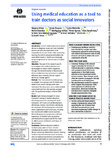Using medical education as a tool to train doctors as social innovators
| dc.contributor.author | Khan, N | |
| dc.contributor.author | Rogers, A | |
| dc.contributor.author | Melville, C | |
| dc.contributor.author | Shankar, R | |
| dc.contributor.author | Gilliar, W | |
| dc.contributor.author | Byrne, P | |
| dc.contributor.author | Serafimov, A | |
| dc.contributor.author | Sira Mahalingappa, S | |
| dc.contributor.author | Sehdev, S | |
| dc.contributor.author | Sri, A | |
| dc.contributor.author | Dave, S | |
| dc.date.accessioned | 2022-06-07T20:10:35Z | |
| dc.date.available | 2022-06-07T20:10:35Z | |
| dc.date.issued | 2022-07 | |
| dc.identifier.issn | 2055-8074 | |
| dc.identifier.issn | 2055-642X | |
| dc.identifier.uri | http://hdl.handle.net/10026.1/19281 | |
| dc.description.abstract |
<jats:sec><jats:title>Introduction</jats:title><jats:p>Current medical education prepares doctors to diagnose, assess and treat individual patients yet lacks the expectation to be responsible for the care of the wider community. Learning the skills to recognise and redress the social determinants of health are increasingly being recognised as an essential part of medical education.</jats:p></jats:sec><jats:sec><jats:title>Objectives</jats:title><jats:p>The goal of this research was (1) to investigate how medical education can be leveraged to reduce health inequalities through the role and practice of doctors and (2) to elucidate how key innovations in medical education are a necessity that can support doctors as ‘change agents.’</jats:p></jats:sec><jats:sec><jats:title>Methods</jats:title><jats:p>Two international multidisciplinary roundtable focus groups with 23 healthcare leaders from various backgrounds were facilitated. The discussions were audiorecorded, transcribed and then thematically analysed with the qualitative analysis software QDA Miner.</jats:p></jats:sec><jats:sec><jats:title>Results</jats:title><jats:p>Eight themes emerged: (1) Social innovation training in medical education; (2) Linking community working with social innovation; (3) Future curricula development; (4) Settings, context, environment and leaving the classroom; (5) Developing links with third sector organisations and community, including low-income and middle-income countries; (6) Including learners’ perspectives and lived experience; (7) Medical roles are political and need political support and (8) The need to address power imbalances and impact of discrimination.</jats:p></jats:sec><jats:sec><jats:title>Conclusions</jats:title><jats:p>Medical education needs to fundamentally widen its focus from the individual doctor–patient relationship to the doctor–community relationship. Doctors’ training needs to help them become social innovators who can balance interventions with prevention, promote good health on a community and societal scale and tailor their treatments to the individuals’ contexts.</jats:p></jats:sec> | |
| dc.format.extent | 190-198 | |
| dc.language | en | |
| dc.language.iso | en | |
| dc.publisher | BMJ | |
| dc.rights | Attribution-NonCommercial-NoDerivatives 4.0 International | |
| dc.rights.uri | http://creativecommons.org/licenses/by-nc-nd/4.0/ | |
| dc.subject | Social innovation | |
| dc.subject | medical education | |
| dc.subject | medical students | |
| dc.subject | medicine | |
| dc.subject | public good | |
| dc.subject | society | |
| dc.subject | community | |
| dc.subject | social determinants of health | |
| dc.subject | health inequalities | |
| dc.title | Using medical education as a tool to train doctors as social innovators | |
| dc.type | journal-article | |
| dc.type | Article | |
| dc.type | Early Access | |
| plymouth.issue | 3 | |
| plymouth.volume | 8 | |
| plymouth.publication-status | Published | |
| plymouth.journal | BMJ Innovations | |
| dc.identifier.doi | 10.1136/bmjinnov-2021-000910 | |
| plymouth.organisational-group | /Plymouth | |
| plymouth.organisational-group | /Plymouth/Faculty of Health | |
| plymouth.organisational-group | /Plymouth/Users by role | |
| dc.identifier.eissn | 2055-642X | |
| dc.rights.embargoperiod | Not known | |
| rioxxterms.versionofrecord | 10.1136/bmjinnov-2021-000910 | |
| rioxxterms.licenseref.uri | http://creativecommons.org/licenses/by-nc-nd/4.0/ | |
| rioxxterms.type | Journal Article/Review |



